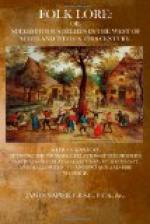The sun, the giver and vivifier of all life, was the primary god of antiquity, being worshipped by Assyrians, Chaldeans, Phoenicians, and Hebrews under the name of Baal or Bell, and by other nations under other names. The priests of Baal always held a high position in the State. As the sun was his image or symbol in heaven, so fire was his symbol on earth, and hence all offerings made to Baal were burned or made to pass through the fire, or were presented before the sun. Wherever, in the worship of any nation, we find the fire element, we may at once suspect that there we have a survival of ancient sun-worship.
The moon was regarded as a female deity, consort of the sun or Baal, and was worshipped by the Jews under the name of Ashtoreth, or Astarte. Her worship was of the most sensual description. The worship of sun and moon formed one system, the priests of the one being also priests of the other.
Apart from the priestly incorporation of which we have spoken, there was another class of men who assumed knowledge of supernatural phenomena. These were known as astrologers or star-gazers, wizards, magicians, witches, sooth-sayers. By the practice of certain arts and repetition of certain formula, these pretended to divine and foretell events both of a public and private nature. They were believed in by the mass of people, and were consulted on all sorts of matters. By both the civil and ecclesiastical authorities their practices and pretensions were sometimes condemned, and themselves forbidden to exercise their peculiar gifts, but nevertheless the people continued to believe in them and consult them. Their pretensions were considerable, extending even to raising and consulting the spirits of the dead.
This leads me to notice the ancient belief concerning the souls of the departed. By almost all nations, Jews and Gentiles, there was a prevailing belief that at death the souls of good men were taken possession of by good spirits and carried to Paradise, but the souls of wicked men were left to wander in the space between the earth and moon, or consigned to Hades, or Unseen World. These wandering spirits were in the habit of haunting the living, especially their relations, so that the living were surrounded on every side by the spirits of their wicked ancestors, who were always at hand tempting them to evil. However, there were means by which these ghosts might be exorcised. A formula for expelling wicked spirits is given by Ovid in Book V. of the Fasti:—
“In the dread silence of midnight, upon the eighth day of May, the votary rises from his couch barefooted, and snapping his fingers as a sure preventative against meeting any ghost during his subsequent operations, thrice washing his hands in spring water, he places nine black beans in his mouth, and walks out. These he throws behind him one by one, carefully guarding against the least glance backwards, and at each cast he says, ‘With these beans I ransom myself and mine.’ The spirits of his ancestors follow him and gather the beans as they fall. Then, performing another ablution as he enters his house, he clashes cymbals of brass, or rather some household utensil of that metal, entreating the spirits to quit his roof. He then repeats nine times these words, ‘Avaunt ye ancestral manes.’ After this he looks behind, and is free for one year.”




